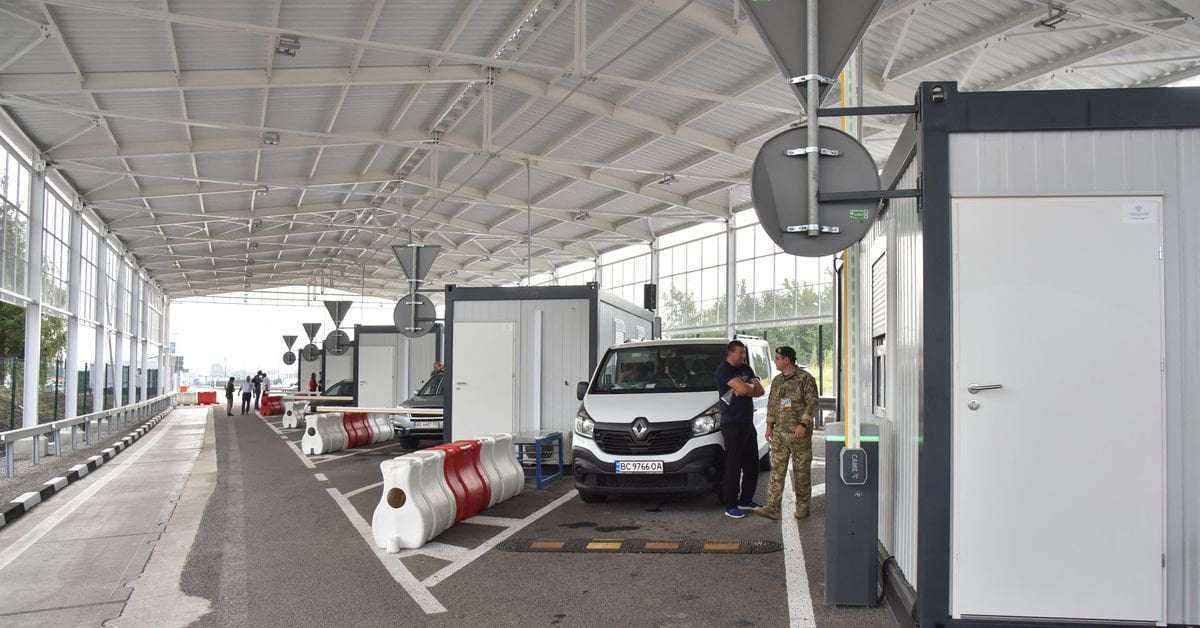[1/2] A man speaks to a member of the Ukrainian Border Guard Service at the renovated Ukraine-Poland border crossing point near the village of Krakovets, as Russia's attack on Ukraine continues, in Lviv region, Ukraine August 16, 2022. REUTERS/Pavlo Palamarchuk
WARSAW, April 15 (Reuters) - Poland and Hungary have decided to ban imports of grain and other food from neighbouring Ukraine to protect the local agricultural sector, the two governments said on Saturday, after a flood of supply depressed prices across the region.
Ukraine expressed regret about the Polish decision, saying that "resolving various issues by unilateral drastic actions will not accelerate a positive resolution of the situation".
After Russia's invasion blocked some Black Sea ports, large quantities of Ukrainian grain, which is cheaper than that produced in the European Union, ended up staying in Central European states due to logistical bottlenecks, hitting prices and sales for local farmers.
In a letter to the European Commission last month, the prime ministers of five eastern European countries said the scale of the increase in products like grains, oilseeds, eggs, poultry and sugar had been "unprecedented", and said tariffs on Ukrainian agricultural imports should potentially be considered.
The impact of the oversupply has created a political problem for Poland's ruling Law and Justice Party (PiS) in an election year, with the economy mired in stagflation.
"Today, the government has decided on a regulation that prohibits the entry, importation of grain into Poland, but also dozens of other types of food (from Ukraine)," PiS leader Jaroslaw Kaczynski said during a party convention.
The list of these goods, which will range "from grain to honey products, very, very many things", will be included in the government regulation, he added.
Ukraine's ministry of agrarian policy and food said the Polish ban contradicted existing bilateral agreements on exports, and called for talks to settle the issue.
"We understand that Polish farmers are in a difficult situation, but we emphasize that Ukrainian farmers are in the most difficult situation right now," it said in a statement.
Later on Saturday nationalist Hungarian Prime Minister Viktor Orban's government joined the ban, saying the status quo would cause severe damage to local farmers.
Hungary did not give details on when its ban on grain and other food imports would go into effect, but said it will expire at the end of June.
Poland's Kaczynski said: "We are and remain unchanged friends and allies of Ukraine. We will support her and we support her. ... But it is the duty of every state, every authority, good authority in any case, to protect the interests of its citizens."
Kaczynski said Poland was ready to start talks with Ukraine to settle the grain issue.
Hungary's government said it hoped for changes in regulation at the EU level, including a re-thinking of the elimination of import duties on Ukrainian produce.
Reporting by Pawel Florkiewicz Editing by Mark Potter
Our Standards: The Thomson Reuters Trust Principles.

No_Caregiver_5740 on April 16th, 2023 at 17:33 UTC »
Goes to show, Domestic politics always trumps international politics
Anyosnyelv on April 16th, 2023 at 09:49 UTC »
I am not happy about this as a Hungarian. Food price inflation is higher than anywhere in the EU. I’d rather buy cheap bread than expensive.
lyonmackenzie on April 16th, 2023 at 01:34 UTC »
SUBMISSION STATEMENT
The Polish government has announced a ban on imports of grain and food products from Ukraine, citing concerns over the presence of mycotoxins in the products. The ban will come into effect on April 16th, 2023 and will apply to all categories of cereal grains, including wheat, barley, and maize, as well as flour and processed food products. This decision has the potential to impact the trade relationship between Poland and Ukraine, as Ukraine is a major supplier of grain and food products to Poland. The Ukrainian government has responded by stating that it will take measures to ensure that its products comply with international food safety standards.
ANALYSIS
This is the main reason why the process of allowing Ukraine into the EU will be long. Ukraine is a very efficient producer of agricultural products. One reason for this is their farms are large, labor is cheap and they have less stringent safety standards.
Prior to the War, Ukraine wasn't a big supplier of agricultural products to Poland
https://oec.world/en/profile/bilateral-country/pol/partner/ukr
Again this has to do with EU regulations. The food exports going to Poland from Ukraine are meant for shipment elsewhere.
This is just a taste of things to come during Ukraine's journey to become a member of the EU.